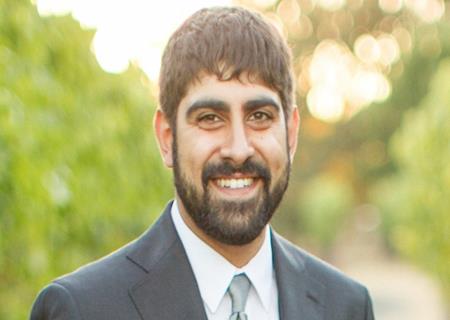
07 Feb Tarun Wadhwa

Speaker: TARUN WADHWA
Carnegie Mellon Academic, Author and Strategic Disruptor
Speech Topics Include:
A Crash Course in Advancing Technologies
Cyber-Security: Exponential Vulnerability and the Potential for Cutting-Edge Innovation
Blockchain: The Opportunity and The Hype
Changing Human Potential: The Future of Assistive Technologies and the Transformation of Healthcare
Tarun is an entrepreneur, academic and award-winning writer who is working at the intersection of technological advancement, innovation, global growth, security, and public policy. He regularly writes for Forbes and The Huffington Post, and his work has appeared in The Economist, The Wall Street Journal, Dow Jones Marketwatch, The Washington Post, Digital-Life-Design, and many other prestigious journals. A noted thought leader, he is currently a Visiting Instructor at Carnegie Mellon University’s College of Engineering and a Visiting Fellow at Emory University’s Department of Political Science. He was also the Co-Founder and COO of AIC Chile, a private innovation lab that creates technologies aiming to alleviate poverty.
Tarun’s anticipated new book, Identified: The Digital Transformation of Who We Are, which explores the global rise of digital identification systems, will be out in the Early 2019. It analyzes the technologies that governments and companies use to see who we are — things such as national identification systems, biometrics, and online identity. He tracks these systems over time to see how they are changing governments, social norms, and the lives of people all around the world.
One of Tarun’s most exciting ventures is Day One Insights, a strategy and advisory firm he founded around technological convergence and corporate reinvention. This work focuses on trends that are overturning established industries; developments in healthcare, financial markets, cyber-security, retail, entertainment, transportation, and the impact of technological advancements on legal systems and societal institutions. All of this cutting-edge research has provided opportunities to partner with several of the most talked about companies in the world and influence leadership decision-making that is transforming these organizations.
It is no surprise that Tarun has become a favorite speaker with these same global companies. He packs his keynotes with eye-opening data, memorable stories, and a charismatic style that is infectious.
A Crash Course in Advancing Technologies
We live in the most innovative and interesting time in history, with unprecedented opportunities and resources becoming widely available. While economists and politicians argue amongst themselves about whether progress has come to a halt, scientists, designers, and entrepreneurs are building the future not just one advancement at a time, but also in clusters. Nearly every field and part of life are in the midst of experiencing a massive technology-enabled transformation that will only grow over the next two decades, for better or worse.
This change is coming due to technologies advancing exponentially. For more than 100 years, the processing power of computers has doubled every 18 months. Now it has come to the point at which our smartphones are more powerful than yesterday’s supercomputers were. Faster computers are now being used to design faster computers, and computers and the information technology that they enable are absorbing other fields.
This fascinating presentation explores the progression of technologies and the driving forces behind this acceleration. Tarun will detail advances in fields such as computing, medicine, sensors, artificial intelligence, digital manufacturing, and robotics. He will explain how they’re changing manufacturing, distribution, and virtually every part of how a corporation operates.
We are seeing startups come out of nowhere to disrupt old industries. Note Amazon.com, a technology company, disrupting bookstores; Apple’s shake-up of the music industry; mapping apps on cellphones’ displacement of GPS devices; and Uber’s transformation of the taxi industry. Innovation has globalized; business models and technology developed in one country can easily be exported to another. Companies will need to make bold changes in order to survive in this new era of industry disruption, and that begins with understanding the larger picture of what is going on.
Cyber-Security: Exponential Vulnerability and the Potential for Cutting-Edge Innovation
The rapid pace of technological change is creating unprecedented security risks for companies. While every day there seems to be a new story of a corporation that has been hacked, the reality is that we are only at the tip of the iceberg. The cyber attacks of the near future won’t be as much about stealing credit cards and passwords as they will be like the events that took place at Sony Pictures, where an entire enterprise was taken apart in the span of three weeks. Executive emails, employee health information, and industry contracts are all fair game in this new age of security threats.
But not only should we be hyper-aware of threats, we need to also look at the cutting-edge creativity of cyber-criminals who are driving arguably the most innovative models of operation in the world.
In order to prepare for the challenges ahead, executives need to understand what has changed and what they are now responsible for. This intriguing speech will dive into the trends in cyber security that will take place over the next 5-10 years. From hacked thermostats sending your competitors intelligence to phishing emails so convincing it is hard to know who is really behind the screen, cybersecurity is going to become one of the largest obstacles that individuals and corporations will face for success.
That’s because the nature of cybercrime itself is changing, and criminals are often some of the savviest and enthusiastic early adopters. By examining their behavior we can understand the nature of the threat companies will face – and also learn their best practices and how they are able to be so effective.
Tarun engages an important discussion of what corporations can do to position themselves for success and an overview of the most contentious debates in the field. It takes important concepts that everyone in business needs to know but distills the most practical knowledge without getting lost in the technical specifics. Customers, clients, and boards are ultimately holding executives responsible for the security of their company. What they will need to learn is a shift in mindset towards proactive defense rather than the status quo of reactive response.
Blockchain: The Opportunity and The Hype
Blockchain is an important technology that needs impartial experts like Tarun Wadhwa to help us sort thru the promises and hype.
The biggest story in the ecosystem of blockchain is tokenization – the ability to turn physical and digital objects into a cryptographically secured digital representation of a set of rights. In other words, a string of code that can be tracked, traded, and split up into micro-fractions. We saw the first wave of excitement with ICOs, which are tokenized company equity, but that’s just the beginning.
Tokens will play a critical role going forward in virtually any digital exchange of value. And the implication of this is the creation of massive, entirely new markets. Assets that couldn’t be sold can now become liquid…it will soon be possible to buy shares in a house or an art painting just as you would stock in a company.
Yet to explore the real opportunities, we must also examine the hurdles that might hamper the growth of blockchain use. It is complex by nature, which make it hard for many users to understand. It lacks oversight thru regulation, which makes it risky. It can be an arduously slow system, which makes it less attractive for simple uses. It uses massive computing power for its checks and balances algorithms, which makes it dependent on large amounts of electrical power. And it promises to remove all the middle men, which also discards the value of expertise and dispute resolution that middle men delivered throughout history.
It is important to understand both the possibilities and the hype. While the vast majority of use cases we hear about today are going nowhere, there is something larger going on. Blockchain or some other form of partially distributed ledger, will ultimately be transformative in defining the future of how we own and exchange things.
Changing Human Potential: The Future of Assistive Technologies and the Transformation of Healthcare
In the next decade, there is going to be a radical improvement in the tools and technologies we rely upon for our daily activities. A combination of the convergence of sensors, scanning, printing, processing, analysis, interaction, and interface technologies are fundamentally changing the way we develop products. Walkers, canes, braces, crutches, and wheelchairs are going to fit our individual bodies, represent our aesthetic preferences, and process huge amounts of data in real-time to improve their performance. Bionics and robotics are drawing from nature to create new devices and artificial body parts, unlike anything we’ve seen in the past. Equipment like the exoskeleton is being applied to soldiers, construction workers, and film crews – effectively wearing the same technology as the paralyzed.
This enthralling talk will detail the impact of the transformation of healthcare through digitalization. He will focus on how innovative devices, procedures, and data analysis will allow humans to live longer, healthier, and more productive lives while restoring physical abilities in a way that was never before possible in the past. And how there is now the opportunity to massively improve quality of life for all people that at one point in their life suffer a physical impairment.
According to World Health Organization, there are one billion people that live with physical disabilities – that’s almost 15% of the population. With an aging population and a global increase in chronic health conditions, the prevalence of physical impairment is only growing. In the United States alone, Center for Disease Control and Prevention estimates that over 60% of the population aged 65 and older have difficulties completing complex actions. Due to illness, injury, or aging, every single person will interact with assistive devices at some point in their life, yet there remains little discussion about what is going on in this space.
Healthcare’s radical transformation is one of the most emotionally and economically significant stories related to technology innovation to ever take place in the world.




